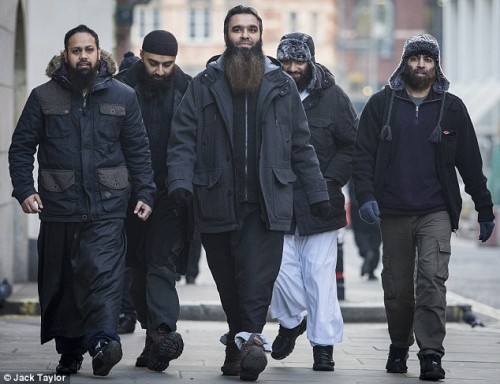Muslim gang barred from gathering in large groups and burning flags after violent outbursts at rallies led by hate preacher Anjem Choudary
By Stephanie Linning
Twelve Muslim men have been banned from gathering in large groups after violent outbursts at a rally led by radical hate preacher Anjem Choudary.
Four of the men have been served with a three-year anti-social behaviour order that also prevents them from carrying flags or setting fire to items in protest.
Judge Paul Worsley QC said the orders were necessary to protect members of the public.

He also restricted what eight of the men are allowed to do when attending a Dawah – a public event where Islam is preached.
Judge Worsley issued the order at the Old Bailey after hearing a day-long argument from lawyers for the men who suggested the Asbo would breach their right to religious expression.
He ruled: ‘I am entirely satisfied that an order to limit the conduct of these defendants is appropriate in each case.’
‘They have proved they are prepared to behave in a way which is totally unacceptable involving violence or threat of violence to members of the public going about their business.
‘I take the view it is necessary for the protection of the public and to ensure crime is not committed that Asbo orders are made.’
The twelve men named in the orders are Munim Adbul, 33, Mohan Uddin, 37, Mohammed Alamgir, 35, Kamran Khan, 30, Qadeer Ahmed, 29, Mohammed Naseer Khan, 31, Moshiur Rahman, 32, Jalal Ahmed, 26, Yousef Bashir, 34, Mirza Ali, 40, Abu Aziz, 32, and Jordan Horner, 21.
Two of them, Mirza Ali and Abu Aziz, 32, have already left the UK and are believed to be in Syria.
All are from Luton and Walthamstow, east London. Seven of them appeared at the Old Bailey today.
The order Asbo comes after the men were all convicted of public order offences for their parts in two violent outbursts in central London in May 2013.
Four of the group of Sunni Muslims – Ali, Uddin, Alamgir, and Khan – were involved in an attack on rival Shia Muslims during a protest march in Edgware Road on 10 May.
Sectarian violence broke out during the rally, organised by Choudary, at which the hate preacher was calling out for jihad in Syria.
Two men were beaten to the ground as members of the violent mob screamed: ‘This is what is going to happen to all Shia’ and ‘Shias are kaffirs. They are the enemy within. They are evil.’
Under the terms of the Asbo, the four men are banned from participating in any protests if notification has not been given to the local authority or police.
They are also banned from burning items on protests except for smoking materials or braziers, carrying a flagpole at protests, or approaching members of the public at protests.
Eight days after the march, all of the group except Horner, Alamgir and Ali, took part in an attack on a football fan as they ran a extremist Islamic stall on Oxford street, central London.
The mob cleared the area of Muslim women and children before attacking Andrew White, and handed out Muslim propaganda as their victim was lying prone on the ground.
Following the attack the men began shouting ‘f*** the Queen.’
One of the group, Jordan Horner, 31, was already subject to an Asbo for taking part in vigilante patrols in east London calling for a Sharia State in the UK.
Those involved in the Oxford Street incident are banned under the Asbo from setting up a dawa stall without first having informed the local authority and obtained permission where necessary.
They are also banned from performing dawa within 200m of any other stall, performing dawa while displaying a banner or flag save for a two-metre banner, being in a dawa group where a flagpole is held, or being in a dawa group where items are burnt save for smoking materials or braziers.
Under the terms of the order dawa is defined as ‘proselytising in a public place not including a mosque’.
The third restriction, which relates to all twelve, states that they ‘must not be in company with each other when attending any protest, demonstration or rally.’
Prosecutor Alex Chalk said: ‘We don’t seek to exclude them from practising their religion nor attending rallies nor performing Dawa, simply that it reflects the needs of competing interests in a democratic society.’
